January9
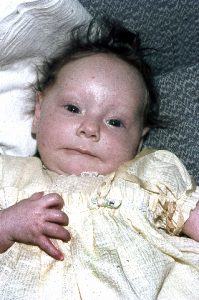 A trick of the light is an optical illusion. We see something that isn’t there, or we see something we think is one thing, then look at it from a different angle and find our perspective is changed, different. My life has been full of such illusions. Often the illusions had me convinced and I indulged and enjoyed the magic, the madness. Other times I surprised myself, finding I was so much more than the first impressions. This e-book is a collection of stories from my own world. We could call them autism stories, but the are stories of personhood and that is more than the sum total of any condition or conditions. We could call them ARTism stories, for my life has been as much that of an artist as that of an autist. We could call them human stories, and I have no doubt many people will find their own humaness within them.
A trick of the light is an optical illusion. We see something that isn’t there, or we see something we think is one thing, then look at it from a different angle and find our perspective is changed, different. My life has been full of such illusions. Often the illusions had me convinced and I indulged and enjoyed the magic, the madness. Other times I surprised myself, finding I was so much more than the first impressions. This e-book is a collection of stories from my own world. We could call them autism stories, but the are stories of personhood and that is more than the sum total of any condition or conditions. We could call them ARTism stories, for my life has been as much that of an artist as that of an autist. We could call them human stories, and I have no doubt many people will find their own humaness within them.
Warmly,
Donna Williams
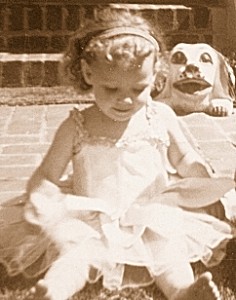 The Fairy Up The Street
The Fairy Up The Street
My mother preferred to call herself a drunk, not an alcholic, and was such since she was 14, 6 years before I was born. The second of nine children to a bush family which rose to government housing, she had got with my father to escape emotional neglect and poverty. She had already had a child to him before she even knew how people got pregnant and now, 16 months after my older brother, she was getting lumbered with me. She had a solution. It was quinine, a malaria drug that was over the counter and used in the 60s to induce home abortions in a time when abortion was not legal and women died from even more dangerous alternatives. It failed. She tried again. It still failed. She was made to keep a child she already detested.
I spent my first 6 months in extreme neglect and deprivation, then in a program for ‘at risk’ children from 6 months to 2 and a half years old. My mother stayed drunk, cried a lot, attempted suicide too many times, took Valium. I never bonded with her. Instead I bonded with the nursing sister at the welfare centre, with my grandparents who lived in a shed in our back yard, with my father, and with the Italian lady at the end of the street. I learned in my 20s that I’d been pushed through the opened gate of Mrs Capellazzo’s house since I was 6 months old and left there. Mrs Capellazzo, not speaking English and socially isolated, took me in.
By the time I was 2 and a half I was diagnosed with autism (at the time this was called ‘infantile psychosis) and by the time I was 3 my mother had developed an interest in me as her ‘doll’ and I was dressed up in a white tulle ballet tutu like a little fairy. It suited me as I shredded roses, spun and ran on my toes. My mother, who desperately needed the self esteem she didn’t have, felt it made people like me and wish they had such a pretty little ballerina girl. And so, on my own, I’d leave my mother to her own world and head down the little dead end street we lived in to the home of a woman who had shown me warmth and kindness all my short life, Mrs Capellazzo.
Mrs Capellazzo had her own daughter now, Sonia, a year younger than me. Mrs Capellazzo would say ‘Dondola’ and put my hand on Sonia’s bouncer and I’d make it rock. I thought ‘Dondola’ my name and didn’t know it meant ‘rock it’.
Soon Mrs Capellazzo made the healthy choice of closing me out of her house so that I might stand a chance of liking my own mother. I stood on her doorstep pressing my face to her glass door. With tears, she pulled down the blind. I waited. Then I waited some more. Then I ate the plants in her garden and played as if her back yard was mine. Still the door didn’t open. Now Sonia’s older brother shooed me away. He was a few years older than me, a big kid, maybe 6 or 7. Finally, I stayed out on the street, then went down the lane at the side of their house to the park at the back of their house. I got on the swing, going up, up, up to see into their back yard.
When I was an adult I parked outside of their house, to remember. One day I got the courage to try the bell. Sonia answered. I knew her sounds, how she sat in her body. I liked her with as much warmth as I had when she was just a toddler. She told me she had become a designer of exclusive bride’s dresses, flowing white tulle like ballerina dresses and she had a shop in a high street selling them. She told me she’d been inspired by a fairy who used to live in her street. Her mother told her, in Italian, how that fairy had been me. Sonia was stunned. She had always thought she’d just imagined that little fairy in her back yard who she would see playing in the park over her back fence.
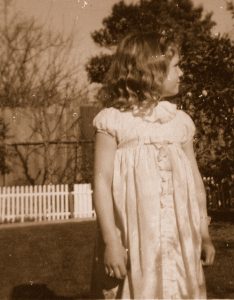 The Getting of Language
The Getting of Language
Language is a repertoire by which we communicate with others, even with ourselves. When I was 2-3 I had no problem communicating. My lack of eye contact said “I’m in my own world, thank youâ€. My use of peripheral vision said “keep enjoying your own world without invading mine and I’ll keep spying on youâ€.
My noises said “I’m bored and entertaining myselfâ€, “I’m blissed and expressing itâ€, “I’m isolated but can’t stand social invasion so I’m filling my world with soundsâ€. My silence said “I’m peaceful, tired, sad, confused, angry, or I quitâ€. My movements said “I’ve got music in my head and here it is played on the air with my fingersâ€, or “I am my own symphony of movementsâ€, or “rhythm tames my body†or “jumping helps me learn things†or “these are tics, they’re not ‘me’â€. My echolalia said “I am part of the speaking world and can speak tooâ€, “I am as normal a person as anyone on the TV, on the radio or singing on a recordâ€. “if I repeat your words I might work out what I’d have meant if I’d said themâ€, “can’t you see you are speaking so much, so fast, or so without gestures or objects I can’t keep up with or access the meaningâ€, “don’t you get the pattern, theme, or feel of the stored phrase I’m coming out with right now?â€
There’s a lot of projection goes on at someone who doesn’t have functional verbal speech. Presumptions about intelligence, emotional or mental health, about lack of potential, lack of a future. There’s also the presumption that just because one can’t process language in ‘real time processing’ that the person won’t store all those meaningless strings of blah and preconsciously this will progressively be processed, even incidentally triggered later. If one has the same problems processing pictures of visual meaning, it is doubly so.
I was 11 years old when I finally used the first novel sentence I can remember with a teacher. It was two years after I’d graduated from the diagnosis of ‘psychotic’ I’d had at age 2 to a diagnosis of language processing disorder at age 9 after which my mother finally conceded to lowering herself to using gestural signing and representational objects and slowed telegraphic speech which finally helped me access the previously inaccessible world of meaning (my father had used these since I was 3 but was ‘banned’ so could only use it when she wasn’t around).
The teacher had insisted I couldn’t have a chair unless I asked for one. The sentence was painstaking, staccato, “I—-w-ant—-chair—-here. It didn’t feel like success, it felt degrading. My voice in my ears didn’t fill me with achievement, it sounded ‘disabled’. My echolalia by contrast had been fluent, full of emotion, in a range of interesting voices, non of which sounded ‘disabled’.
I responded to this distaste with Selective Mutism. My father set about making me laugh, modelling madness and singing as he jumped on the table announcing he was Elvis and breaking into song. He left a typewriter in my room. I began to type letter strings, then word lists, finally poetry. I’d crack, stop choking on a pride sandwich, laugh out loud, find myself singing under my breath, type something that dared expression and the spell would be broken.
If only still self chatter, I’d speak again for another few days, weeks, months before the next round. But eventually I got over the distaste, the intense fear of exposure that came with the jarring sound of my own voice in my ears, the anxiety that I was connected directly with others in my own voice, through language, that I’d somehow opened a door they might never allow me to close again.
When words married meaning, intellect was born. I was as intelligent as I’d ever been, but now I had passion, drive, an appetite to understand things. I read indexes and phone books, devoured words, memorised pages and discovered I could flood my brain with such tsunamis of words that my conscious mind would quit and it would get stored instead in the triggerable world of ‘unknown knowing’ somewhere ‘back there’.
In time I could finally read lines and short passages with meaning. I read the dictionary, the encyclopedia, and didn’t care whether I consciously understood a thing or not. I knew some other part of me would work it out with or without me. And, ultimately, it did.
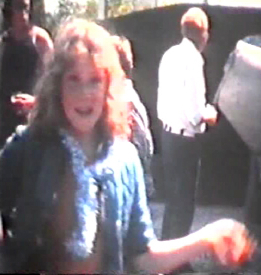 Post Office Adventures
Post Office Adventures
Echoed speech is a great party trick. Speak in any voice, recite jingles, reel off a sit-com episode, but you can’t ask a single question. So I don’t know how the penny dropped but when it was at our second house, when I was eight that I first understood that the guy on the bike putting letters in our brick letter box was bringing things from from people ‘out there’ somewhere.
Letters had stamps. Stamps had pictures, tiny pictures, and the smaller the picture the more whole and cohesive, and therefore with meaning, the picture was. On these stamps were pictures of animals, of people doing things, of buildings and places, cars, planes and boats, flowers and animals. These little worlds called me in through their pictures to things and places my fragmented vision had never before ‘got’.
The newsagent sold swap cards with pictures, buttons in tubes which came in all shapes and colors; apples, stars, daisies and ducks. It had ribbon, cellophane, sticky tape and staplers. It had sharpeners and paper clips, erasers and rulers. It sold ink pads and paper and greeting cards with glitter. It sold newspapers with one line stories, magazines full of faces and bodies and clothing, Enid Blyton books with glossy hard covers, comic books and all things print. But most of all, it was the shop that sold stamps and even stamp albums. People entered with letters, bought stamps, stuck them on. Their letters had stamps and writing that had names and addresses.
The red post box had a slot. People posted their letters in there and I would watch the mystery unfold. The stamps on the letters were the bus ticket by which letters got to travel with the postman. The letters would wait to be found and dug out into the postman’s bag. The postman had a sack, like in pictures of Santa, lots of red but no white beard, no sleigh or red suit. If I could have had a try I’d have posted myself through that slot and waited in the cupboard of that red post box to be collected in a bag and somehow magically arrive at a house, delivered to a letter box. I was too big. So I posted my ice-cream, an apple core, a lolly wrapper and wondered who they would go to, what the postman would do when he found them. Johnny was four, I was ten and fresh to functional language. So was he, and so we hung out as comrades, haunting the shops. Johnny had an addiction to comics. And it was there we saw our road to stamps.
On the back of the comic was a picture of stamp collections and the word FREE. It took many a visit before the owners helped us cut out the advertisement, fill it out with my name and address, put it in an envelope and put a stamp on it for us to post. We were on our way to our own stamp collections! Out to the red post box went our letter. I was told to watch the letter box at home for the stamps to arrive. And arrive they did, a letter with MY name on it and inside a treasure trove of stamps from all around the world. There were stamps with animals, of people doing things, of buildings and places, cars, planes and boats, flowers and animals. I was smitten. I cut out all the coupons from all of Johnny’s comic books. I was going to have a mountain of stamps, a gazillion mini worlds to explore.
My older brother had a coin collection. It had special edition 50 cent pieces. I knew these were ‘special’ but so much in the house was ‘that’s your brother’s’ that it meant nothing anymore. So into the jar I dipped and down to the newsagent I went. Stamp on my letter and into the red postbox. Then wait. I checked the letter box daily, then they arrived, packets and packets and packets of stamps. I was ecstatic. I ferreted them up to my attic bedroom. Next I would get myself a stamp album. But before I could complete my accomplishment there was that sound… “Do-nna!†in that tone that made my blood run cold. My mother’s feet thundered up the stairs demanding coldly “where are the stampsâ€. She confiscated them like a prison warden and I watched my bounty leave in her custody. I could not understand what I’d done so wrong. It was such a huge achievement. Was it the 50 cents I’d taken to buy the stamp and envelope?
Having language processing disorder I had enough comprehension to understand the word FREE. What I lacked, however, was comprehension of the words that followed… “14 day trial offerâ€. The bill for the stamps was enormous. I’d achieved alright. I’d achieved finding one more way to be just clever enough to get myself into trouble.
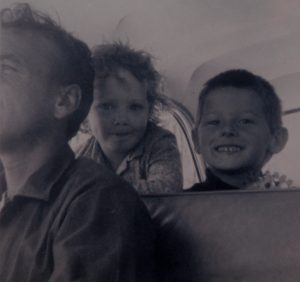 When I Was a Doorbell
When I Was a Doorbell
There’s ‘interests’ and then there is ‘merging with things’. When a Buddhist monk is deep in meditation becoming one with the silence or ‘the light’, losing all attachment to body, to mind, to emotions, this is not being ‘focused on a special interest’, it is the process of ‘merging’.
Merging, to master it, requires high level skills in dissociating from one’s own body, mind, emotions, but the payoff can be far richer than the perceived losses. I used to merge with the wind, putting my face into it, my eyes closed, losing all awareness of my separateness from it, no sense of my human body, mind, my own emotions. I would sit on the window ledge of the front passenger door as my mother drove the car (it was the 1960s, seatbelts were not compulsory, nor were child seats). With my face into the wind, my hair blowing furiously behind me, my eyes closed, I would be ‘flying’ as if I were the wind itself. I would merge with the charged dust particles swimming and swirling and dancing against a blue summer sky. I merged with the smell of lemon blossoms and the buzzing of bees, with the feel of velvet under my palm, with the wild flying diamante water drops of the hose and the sprinkler.
At the next house it was the flocked velvet wallpaper, the tinkling glass chandelliers I’d climb up to to clatter and try and spin. It was the beaded curtain I’d stand in for hours clattering its strings and the pink snooker ball I stared through until I knew through resonating with this in my body (without touching it) what it was to be that solid, that simple, that perfect, that pink. It was the cat I’d lay with, two feet apart, merging with its breathing, its purring, empathising, mapping its patterns until my own were so far away, so dissociated and irrelevant that I knew what it was to feel like a cat. But the first time I had a war over my over-developed mastery of merging was when I began to become a doorbell.
There is merging, and there is falling in love. I was eight years old and I had crossed the line.
Wind, wind, wind, ring, ring, ring, ring, ring, wind, wind, ring…. Hour after hour, scream after frustrated and infuriated scream by my mother who failed to appreciate my bliss, this spirituality, this intense deep relationship (before casettes and CDs, ‘Walkmans’ and ‘Discmans’ most people never owned headphones). The bell cover was removed. I wound the bell: “brrrrâ€, “brrrâ€.
When I was ten years old, I arrived home from school to find the ringable doorbell was gone completely. In its place was a push button one with no bright sparkly “ringâ€, just a 1970s “bing-bong†chime. If there was one thing I loved more than a winder it was a press button. Press, press, press, bing-bong, bing-bong, bing… My mother took the batteries out. I was like a junkie going through withdrawal. I took the back panel off, found the chime bars and struck the chime bars with my finger: ping, ping, ping, ping, ping….
To my greatest heart’s content I soon found one of my closest friends. My father had always used an indirectly confrontational approach to get me to take possession of things because I ‘found it’ and nothing, I repeat, nothing could compete with something I felt I had ‘found’ for my autonomous, non conformist self.
The magical metal fork was just standing there, staring at me from the hinge of my closet, just standing there like a tall stiff soldier waiting to be collected. I picked it up and struck the metal bars with my finger: ping, ping, ping.
Together with a chandelier crystal and a small cupid statue, this tuning fork would now live in my pocket throughout grades five and six, supporting me amidst the isolation, alienation and bullying of the last years of primary school.
When distressed I’d hold the little cupid in my hand, seeing this tiny statue as a whole in ways my fragmented vision didn’t afford me with things larger. I’d look through my chandelier crystal at objects multiplied now as beautiful patterns. And the tuning fork and I would commune: ping, ping, ping.
—
Polly Samuel (aka ‘Donna Williams’)
Author, artist, consultant and presenter.
http://www.donnawilliams.net
I acknowledge Aboriginal and Torres Strait Islander people as the Traditional Owners of this country throughout Australia, and their connection to land and community.
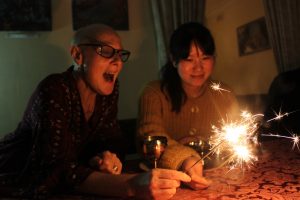 I only ever wanted equality… so look across at me, now and later, never up at me… find the sistership in me and you will see why admiration was blocking it. Read the rest of this entry »
I only ever wanted equality… so look across at me, now and later, never up at me… find the sistership in me and you will see why admiration was blocking it. Read the rest of this entry »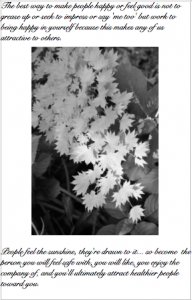 To love is TO EMPOWER and perhaps this is never so pertinent as when talking about someone who is in their last months in the body.
To love is TO EMPOWER and perhaps this is never so pertinent as when talking about someone who is in their last months in the body. 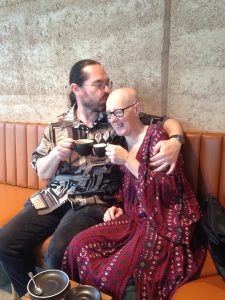 Chris and I have been more than husband and wife, more than lovers, more than family to each other…. we have been incredible best pals. We have spent 17 years in each other’s company and we are still so interested in each other’s lives, thoughts, feelings, learnings, experiences, silliness and bad jokes.
Chris and I have been more than husband and wife, more than lovers, more than family to each other…. we have been incredible best pals. We have spent 17 years in each other’s company and we are still so interested in each other’s lives, thoughts, feelings, learnings, experiences, silliness and bad jokes.  A trick of the light is an optical illusion. We see something that isn’t there, or we see something we think is one thing, then look at it from a different angle and find our perspective is changed, different. My life has been full of such illusions. Often the illusions had me convinced and I indulged and enjoyed the magic, the madness. Other times I surprised myself, finding I was so much more than the first impressions. This e-book is a collection of stories from my own world. We could call them autism stories, but the are stories of personhood and that is more than the sum total of any condition or conditions. We could call them ARTism stories, for my life has been as much that of an artist as that of an autist. We could call them human stories, and I have no doubt many people will find their own humaness within them.
A trick of the light is an optical illusion. We see something that isn’t there, or we see something we think is one thing, then look at it from a different angle and find our perspective is changed, different. My life has been full of such illusions. Often the illusions had me convinced and I indulged and enjoyed the magic, the madness. Other times I surprised myself, finding I was so much more than the first impressions. This e-book is a collection of stories from my own world. We could call them autism stories, but the are stories of personhood and that is more than the sum total of any condition or conditions. We could call them ARTism stories, for my life has been as much that of an artist as that of an autist. We could call them human stories, and I have no doubt many people will find their own humaness within them.  The Fairy Up The Street
The Fairy Up The Street The Getting of Language
The Getting of Language Post Office Adventures
Post Office Adventures When I Was a Doorbell
When I Was a Doorbell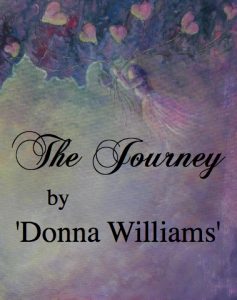 To my husband Chris who journeyed with me 17 years teaching and gifting me so many things & to my friends Scott & Morghana who understood what journey meant and gave me the joy of watching theirs in action.…
To my husband Chris who journeyed with me 17 years teaching and gifting me so many things & to my friends Scott & Morghana who understood what journey meant and gave me the joy of watching theirs in action.…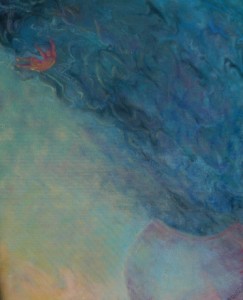 We are all born, physically, but there comes a time, ready or not, when we find it has become ‘our own life’.
We are all born, physically, but there comes a time, ready or not, when we find it has become ‘our own life’.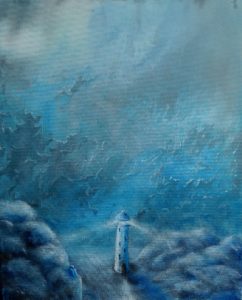 We all reach a time where we don’t want to be found, sometimes by others, sometimes by ourselves. We hide from the light, from en-light-en-ment, sometimes openly under a facade or role, sometimes beneath a false smile, our defensiveness, the ego-dom that helps us hide from realness and facing up.
We all reach a time where we don’t want to be found, sometimes by others, sometimes by ourselves. We hide from the light, from en-light-en-ment, sometimes openly under a facade or role, sometimes beneath a false smile, our defensiveness, the ego-dom that helps us hide from realness and facing up.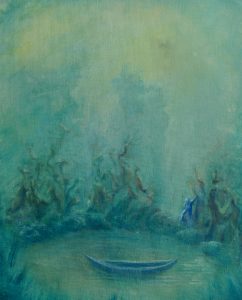 Eventually, we wander and that wandering eventually brings us to a place of opportunity and, with it, usually dilemma or anxiety. The boat could take us to a different journey, but what lurks in the water? How do we solve getting to the boat or even dare to see where it might take us? Are we ready to seize the day, to take the journey?
Eventually, we wander and that wandering eventually brings us to a place of opportunity and, with it, usually dilemma or anxiety. The boat could take us to a different journey, but what lurks in the water? How do we solve getting to the boat or even dare to see where it might take us? Are we ready to seize the day, to take the journey?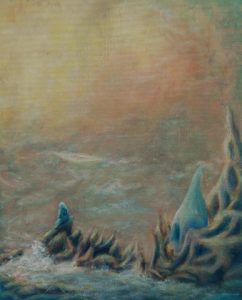 We journey far and wide, many and varied paths we tread through inner worlds, outer worlds, until we are indeed well traveled. There, we find ourselves at ‘land’s end’ and perhaps set up camp to contemplate what is beyond this.
We journey far and wide, many and varied paths we tread through inner worlds, outer worlds, until we are indeed well traveled. There, we find ourselves at ‘land’s end’ and perhaps set up camp to contemplate what is beyond this.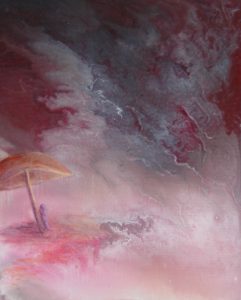 We reach a point where we become aware enough to release ourselves and others from baggage and this sets us free, within ourselves, amidst others.
We reach a point where we become aware enough to release ourselves and others from baggage and this sets us free, within ourselves, amidst others.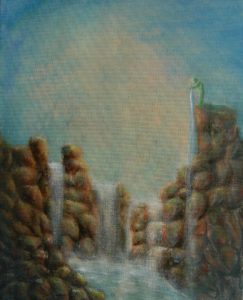 This place of freedom opens us up to letting things flow; our expression, our creativity, our capacity to connect broadly to others, to nature, to the world, to our place in the universe.
This place of freedom opens us up to letting things flow; our expression, our creativity, our capacity to connect broadly to others, to nature, to the world, to our place in the universe.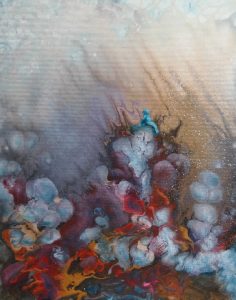 Then there is a time where we find ourselves in a stillness, a dream time. All the do-do-do has ceased. This is a being space. We are not waiting, yet we are also not striving. We are open.
Then there is a time where we find ourselves in a stillness, a dream time. All the do-do-do has ceased. This is a being space. We are not waiting, yet we are also not striving. We are open.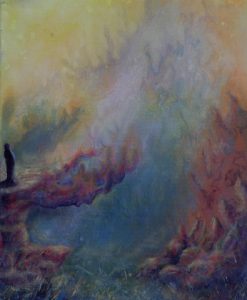 Finally, there is awareness. We have connected the physical world of our lived life in the vehicle we call ‘our’ body with the spiritual world that transcends this. Here we become at ease that all life is interconnected and we are already incarnated in all we have moved, inspired, taught, impacted, shared just as we have been the products of all who moved, inspired, taught, impacted and shared with us.
Finally, there is awareness. We have connected the physical world of our lived life in the vehicle we call ‘our’ body with the spiritual world that transcends this. Here we become at ease that all life is interconnected and we are already incarnated in all we have moved, inspired, taught, impacted, shared just as we have been the products of all who moved, inspired, taught, impacted and shared with us.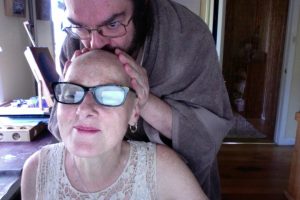 Before anyone self righteously takes a stand against right to a dignified death, keep in mind dying with dignity has strong clear guidelines… the person must have no more than 6 mths to live and this must be confirmed by two doctors and the person must be living with unendurable suffering…. then consider this…
Before anyone self righteously takes a stand against right to a dignified death, keep in mind dying with dignity has strong clear guidelines… the person must have no more than 6 mths to live and this must be confirmed by two doctors and the person must be living with unendurable suffering…. then consider this…  Facing death… I keep hearing how brave, how positive I am. But is it all about positivity, or is it broader? I’ve been trying to understand what has shaped my perspective to see if it really all came down to positivity… or something else. I wanted to know this because facing death is so hard for many people, so why was this transition relatively ‘easier’ for me?
Facing death… I keep hearing how brave, how positive I am. But is it all about positivity, or is it broader? I’ve been trying to understand what has shaped my perspective to see if it really all came down to positivity… or something else. I wanted to know this because facing death is so hard for many people, so why was this transition relatively ‘easier’ for me? 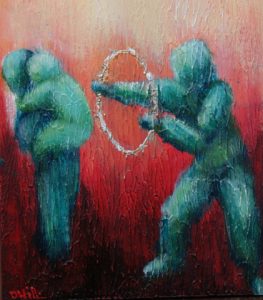 The battle between those who see humanity, dignity, equality, inclusion and those who see preservation of a self interested status quo is the age old battle between change and resistance to change, flow and stagnation, openness and self righteous certainty, a clear mind and one boxed and limited by fiercely defended (often culturally inherited) dogma.
The battle between those who see humanity, dignity, equality, inclusion and those who see preservation of a self interested status quo is the age old battle between change and resistance to change, flow and stagnation, openness and self righteous certainty, a clear mind and one boxed and limited by fiercely defended (often culturally inherited) dogma. 